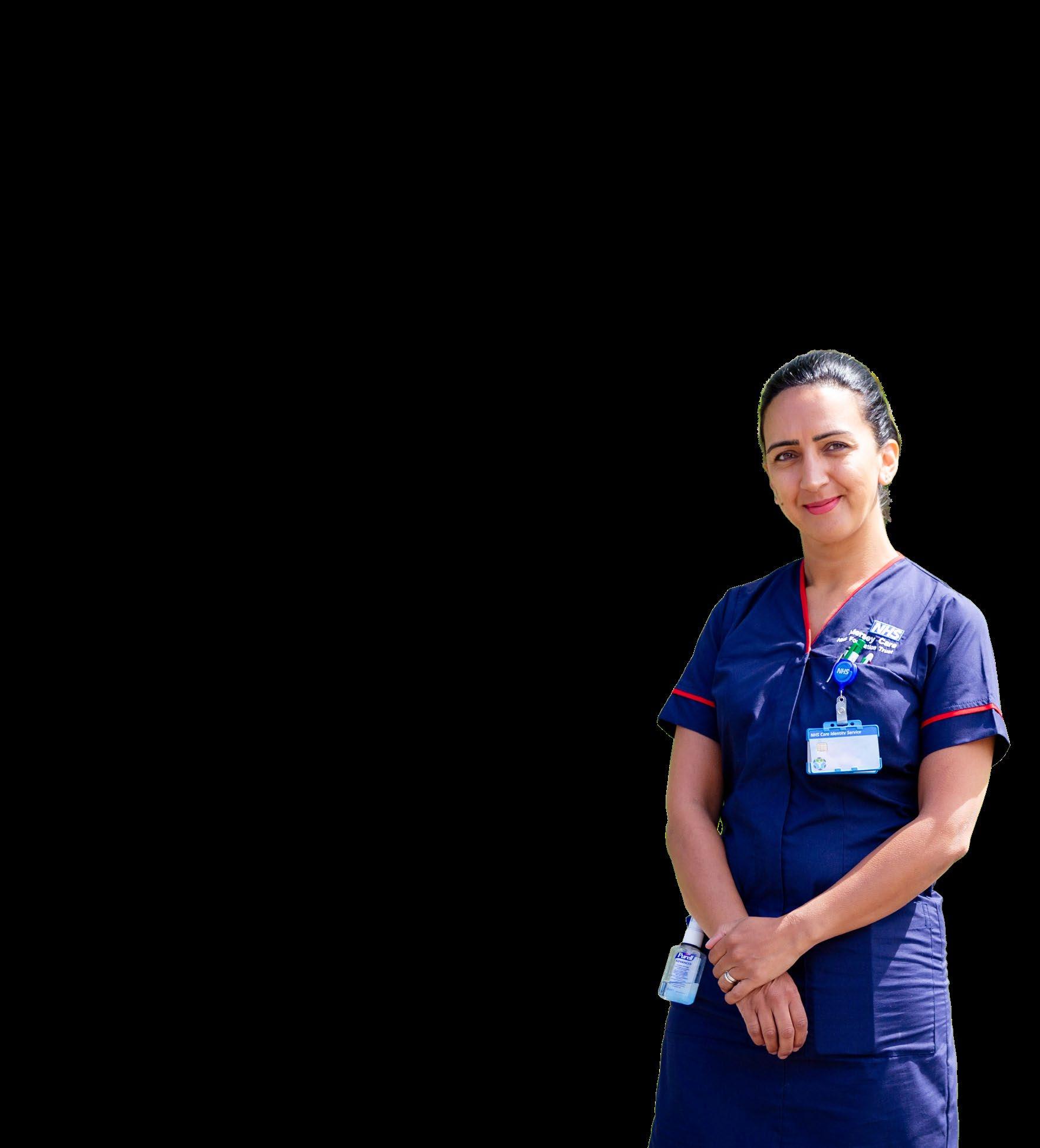





“How do you do it?” said night.
“How do you wake and shine?”
“I keep it simple,” said light.
“One day at a time.”
Lemn Sissay








“How do you do it?” said night.
“How do you wake and shine?”
“I keep it simple,” said light.
“One day at a time.”
Lemn Sissay

Blue skies have been the order of the day this year as unusually balmy temperatures heralded an early start to summer.
Whatever the weather, taking time for ourselves and giving time to others reaps benefits all year round. We hear from fearless mum Rachel who climbs mountains after reframing her health fears into gratitude (p8) and from James (p6), whose new found love of cooking has benefited not only his own mental health but also his neighbours’ tums!
When nurses Marianne Yates (p12) and Sonia Roberts (p22) took up mixed martial arts and dragon boat racing respectively, they both picked a winner. With uplifting support from her son Jayden, Marianne is now fighting fit and Sonia’s lymphoedema following breast cancer has almost gone. Proof that we should all try something new.
If it’s a new career that you are after, Paula and Phil both found a Mersey Care apprenticeship that has changed their lives (p28). And if you are a new carer for someone dear to you like former
Tell us what you think about MC Magazine and you could win a Whittard of Chelsea Coffee Lovers Kit worth £20. We need your thoughts
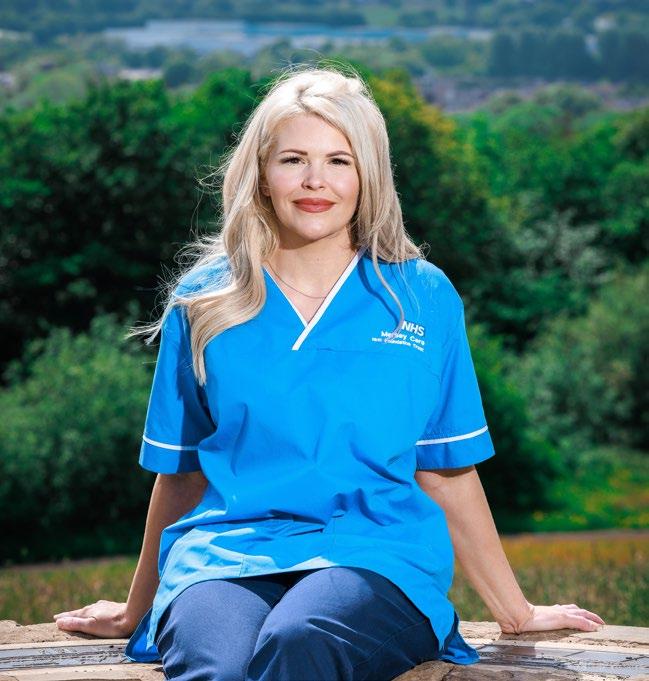
Paula’s New horizon
Earn while you learn
diplomat Sara Yearsley (p24), you too might realise how many of your skills are transferable to your new role.
Come rain or shine, enjoy this issue and your summer.
The MC Magazine team.
Fill in the survey before 30 September and you’ll be entered into a free prize draw.



James says mindfulness helps him manage his OCD

Even as a small boy, James noticed he had some unusual habits. “I’d count numbers of steps in a staircase. Walking on grass was okay but lines and cracks in a pavement needed to add up to ten.”
Growing up with OCD, James developed habits to help him cope which included scratching and picking at his skin. “By concentrating on the pain, it took my mind off how I was feeling.”
He continued to struggle with intrusive thoughts and the condition eventually heightened to the point that he was drinking heavily and thought he didn’t want to go on living.
To James’ astonishment, a mindfulness course has turned his life around.
“It taught me not to panic when a distressing thought comes into my head.”
“I didn’t think it would work for me because I struggle to stay still and my mind wanders. But I use it to focus on daily tasks.”
Cooking has been a big part of his mindfulness process - choosing the ingredients, creating a fresh meal and sharing food with his neighbours.
“I haven’t had a takeaway in months and making food for others - an act of kindnessboosts my feel good hormones. Even washing the dishes has taught me to focus on the present and enjoy everything I do.
“Mindfulness has brought me back from the brink of suicide. I will always have the intrusive thoughts, but I know now just to let them go.”
Catherine has lived with OCD since she was 12 but she was 35 before she was able to confide in anyone. Her OCD encompasses all aspects of her life and she works part time because the condition is so mentally and physically exhausting for her.
If she doesn’t do things in a certain order, she believes harm could come to someone she loves.
“From when I get up in the morning, to when I go to bed at night, I carry out a lot of ritualistic or safety seeking behaviours, because it’s the only way I can feel safe.”
The rituals only bring temporary relief and Catherine has tried to address her OCD over the years through therapy. However, simple activities like visiting a supermarket or going to unfamiliar places remain extremely difficult for her. Her advice to anyone who recognises these symptoms in themselves or someone they love is to seek help through your GP or an OCD charity.
“With treatment, whether it be medication, CBT or a combination of both, most people will get at least a partial recovery. Get the treatment early, get onto a recovery pathway and get living a fulfilling life again.”
Catherine is a volunteer for an OCD charity. Read other people’s stories on their website.
www.ocduk.org

We explore the power of thought and how therapy is for life, not just for a crisis.
In the BBC series Change Your Mind, Change Your Life, celebrity husband and wife hosts Matt and Emma Willis match people navigating mental health journeys with therapists to explore ways to overcome their anxieties.
No scenario is the same, but all show how you think can make a difference - and that therapies once learnt can be a tool for everyday resilience.
The couple discuss their own experiences. Matt, member of boy band Busted, reunites with the psychotherapist who worked with him to understand the emotions behind his battle with addiction. Emma, who
hosts The Voice, shares her own health anxieties. Weeks before the programme was aired this summer, she’d discovered a hole in her heart which needed surgery.
“It really knocked me. I didn’t feel like myself and didn’t know how to cope.”
She used talking therapies, cognitive behavioural therapy (CBT) and mindfulness to find clarity, strength and a path to healing that helps her in everyday life.
"I didn’t think I needed it,” she says in the programme. “Now I see it as something that should be available and encouraged for everyone. There is talking on a surface level but there’s so much more going on inside.”
Read Mersey Care’s self help guide on managing anxiety
Talking Therapies (visit NHS.UK to find a service local to you)
nhs.uk/mental-health/ conditions/health-anxiety

mind.org.uk


Talking Therapies team manager Rachel Munn is a trained psychotherapist. She has helped people cope with mental health issues but she needed help herself after she had a heart attack at 32 weeks pregnant with her second daughter, due to a rare genetic condition. After a long physical recovery she began worrying about her health, admitting she was in a bad place.
“I became obsessed with my health and was constantly watchful for signs something was wrong with my heart again. I don’t think I was present enough for my girls.”
Rachel soon realised she needed to follow her own advice. She would keep a ‘thought diary’ of fears and wrote down reasons not to worry next to them. “Therapy and mindfulness helped tooI’d identify negative thoughts but then try to refocus my
attention elsewhere, reducing the battle I had with these thoughts.”
“I benefited most by focusing on solutions - thinking about what I could do, rather than what I couldn’t. I started off with tiny steps to challenge myself - sitting up in a chair for a short time, walking upstairs and then eventually walking to the lamp post outside my house.”
Short walks gradually became longer rambles, often with a supportive group of friends and daughters Evelyn, now nine, and Ettie, five. After checking with her doctors that they felt it was safe, Rachel was determined she was no longer going to live in fear and rediscovered her love of hillwalking.
“I had built myself up steadily but even now I have the fleeting thought of ‘What if something happens?’, especially when I’m out on my own. From day one I focused on reframing that fear into gratitude.
I am just so grateful to be able to be so active again because there was a time when I thought it would never be possible.
“Hiking has been a huge part of my recovery - as my confidence has grown, so have the hills I’ve climbed. I know now how much is within my power to change how I feel.”
Rachel shares the joys of hiking online:

Living life to the full. Rachel with her daughters Ettie and Evelyn
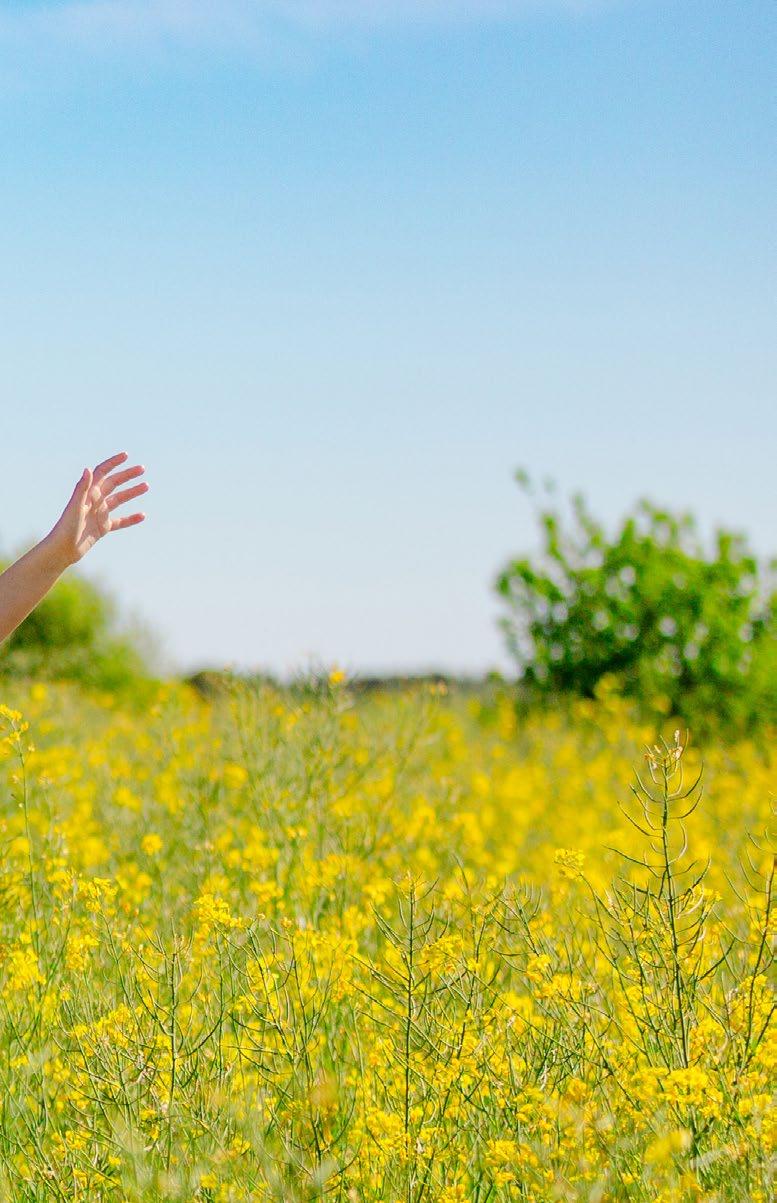
First steps
Rachel recommends these routes for new hikers:
• Moel Famau Short Circular – a 6km circular trail near Ruthin, Denbighshire
• Lud’s Church and the Roaches in the Peak District - a moderately challenging 12.5 km circular trail
• Chrome Hill and Dragon’s Back in Derbyshire – a challenging 14km circular trail with spectacular views.
Different types of psychological treatments for mental and emotional problems like stress, anxiety and depression. They all involve working with a trained therapist. For some problems and conditions, one type of talking therapy may be better than another.
The therapist helps you understand and cope with the problems you're having. This may be one to one, in a group, online, by phone, with your
family, or with your partner. Different talking therapies also suit different people.
Talking therapies are available through the NHS. You can refer yourself direct to a NHS talking therapies service without a referral from a GP. If you prefer, see a GP and they can refer you and share relevant information about you.
Visit merseycare. nhs.uk/talkingtherapies

Therapy helped Rachel get her life back on track and she’s now fundraising for Mersey Cares NHS Charity to give back to the services who support people’s mental health. She completed the sponsored Three Peaks Challenge in 2024 and will take on the charity’s Snowdon at Night climb in August.
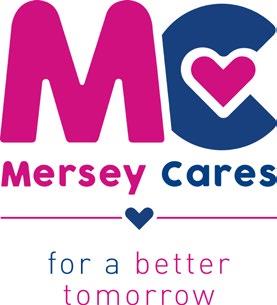
Hannah with her parents Julie and Tony. Their support has been a huge part of Hannah’s recovery

How putting pen to paper can help reduce anxiety.
More than just a diary, keeping a journal is recommended by mental health charity Papyrus to find sanctuary in the whirlwind of modern life.
Reviving old fashioned skills with simple pen and paper could be the new way to find calm, interrupt negative thoughts and declutter our minds.
Writing your thoughts down, sometimes known as journalling, can help organise thoughts and make problems more manageable. Detailing how you are feeling - and why - forces the brain to slow down. Reading what we have written helps identify patterns in our behaviour and the triggers for our anxieties.
For Hannah from St Helens, her beautifully illustrated journal is a vivid testament to how far she has come. Less than 12 months ago, she was in hospital, dangerously ill with the eating disorder, anorexia. This summer, she took GCSE examinations she wasn’t expected to be able to sit, joined her friends at the school prom and is looking forward to a bright future at college. Every page of her journal is proof of each small step on her long road to recovery.
With support and encouragement from nurse Margie Pardoe at Mersey Care’s Children’s Eating Disorder Service, Hannah began her journal to record the huge challenges she has overcome so far. The neat handwriting and careful illustrations make reading her extreme emotions even more profound. It’s heartrending to read her fear and guilt and the
depiction of her eating disorder as a fake friend.
Hannah wrote her journal for herself, but she hopes it will give other people battling eating disorders inspiration and hope. It will be shared as part of a training package by Mersey Care for GPs, teachers and social workers to help them understand the condition.
“It’s so therapeutic for me to write things down - it helps me talk through what made me happy and what absolutely terrified me.”
“Looking back through it and remembering how I felt, I realise that if I had let those feelings take over, I would have missed all of the memories I’ve made since. I am still recovering and I will have battles in my head for a long time when I still don’t want to eat.
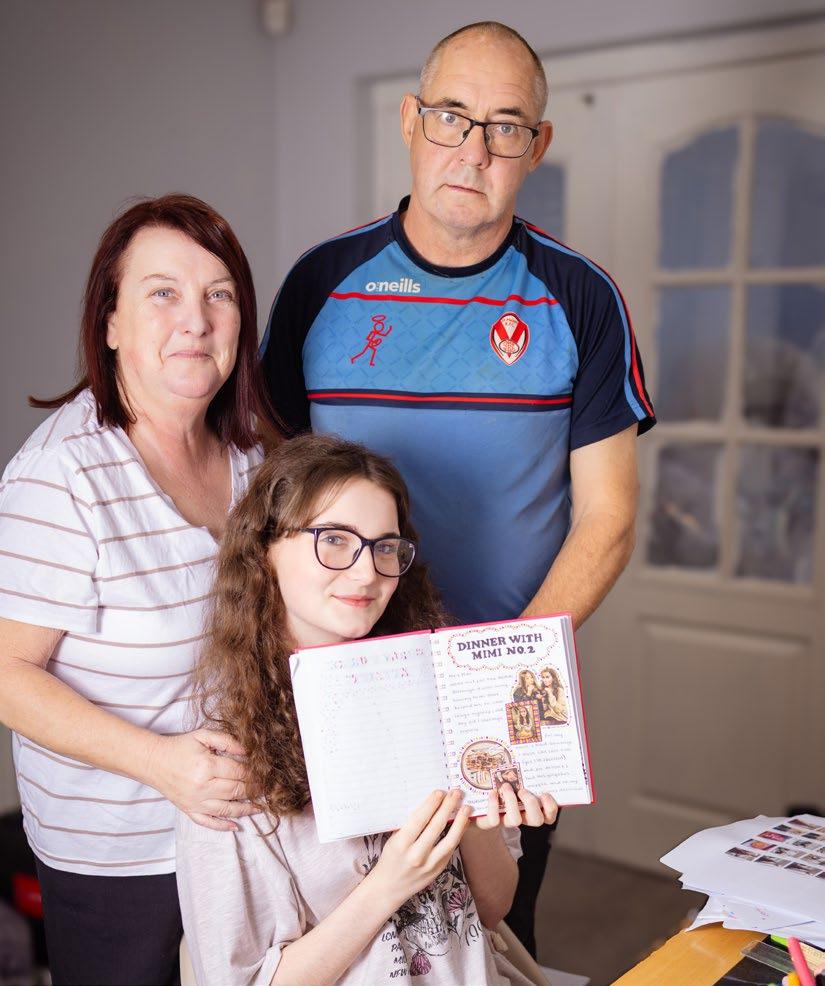
More support beateatingdisorders.org.uk
merseycare.nhs.uk/childrenseating-disorders papyrus-uk.org
The documentary film My Mind and Me uses Selena’s real journal to take us through each scene. The last entry that closes the movie states, “I’m at peace, I’m angry, I’m sad, I’m confident, I’m full of doubt, I’m a work in progress, I am Selena.”
As revealed on Loose Women, Chris dedicates 12 minutes each day to writing down everything that’s bothering him to release pent up emotions.
Model and influencer Gigi told Harpers Bazaar she keeps multiple journals to take stock of her emotions. “I like the separation. I write on the back of receipts and keep those in a notebook. I’m not particular about it, and my journals are everywhere around the house. I just pick up whichever one is closest to me and write.”

The journal is a record to prove to myself I can beat this. I can carry on and I will keep adding to these memories.”
Margie says that Hannah’s journal has been a huge part of her recovery. “Tracking each step towards recovery and focusing on the positives has helped Hannah process some really difficult emotions. She’s been so brave and I think she’s such an inspiration.”
There are a range of self help guides around anxieties and eating disorders. If you are struggling with your emotions, please talk to your GP.
merseycare.nhs. uk/self-help
Mersey Care self help guides

• You don’t need fancy notebooks or perfect handwriting. Just a quiet moment and something to write with
• Set a timer for five minutes and let the words flowdon’t worry about spelling or grammar
• Write down three things that went well, you enjoyed, or that you achieved each day. After five days, look back at the things you’ve highlighted
• You can write in your journal daily, weekly or whenever stress gets too intense. Whether it’s five

minutes in the morning or just before bed, just opening your notebook can trigger a sense of calm if it’s done regularly
• If you can’t bring yourself to pick up a pen, you can record your thoughts on a Smartphone or recording device.



Marianne is a senior practice nurse with Mersey Care, supporting GP practice nurses across Liverpool. She trained with Aspire Combat Sports Academy, Liverpool

When nurse
Marianne Yates took up mixed martial arts to raise money for charity she couldn’t have known how much it would change her life. Now she’s urging others to follow her lead.
“I love my job and being mum to my 16 year old son Jayden, but at 37 I felt physically and mentally depleted. I needed something for me and to give something back. I saw an advert for a mixed martial arts charity event and thought ‘Why not?’
I’m from a family of strong women. My mum grew up in an Asian culture but left to avoid an arranged marriage, which was rare in those days. She and my dad raised me to be resilient against racism, strong and independent. But I’m naturally a nurturer, I prefer resolution. The only person I’d ever had a fight with was my brother when we were growing up!
I hadn’t given a thought to what I was getting into. Going into a male dominated gym felt intimidating but everyone is so respectful and encouraging. The training was intense, I’d come home bruised and sore. But I became fitter and more toned.
I was humbled by what I learned about myself. MMA gives you strength and endurance but also self discipline. There’s such a strong sense of community and respect.
Fight night was very scary, but by then I’d raised £1000 for Cancer UK. My family and friends were there– I couldn’t lose.
That didn’t stop my heart pounding as I stepped into the cage but as I fought I could hear my trainers giving me tips. Before I knew, I’d won.
Marianne with her son Jayden


Mixed martial arts is a full contact fighting sport based on striking and grappling, incorporating techniques from various combat sports from around the world. The English Mixed Martial Arts Association’s objective is to promote MMA as a sport for everyone, regardless of origin, social status, race or religion and to promote the Olympic spirit of fair play.

I’ll never forget the feeling when my son Jayden ran into the cage and picked me up. He’s an MMA fighter too. I’ve always taught him there’s nothing you can’t achieve if you work hard. I’d say to anyone else who needs uplifting - just do it!”
Women’s MMA was thrust into the limelight by Liverpool’s Molly McCann. When she announced her retirement this year, the BBC said Molly ‘can stake her claim as the best British female MMA fighter’. Nicknamed ‘Meatball’ because of an early job in Subway, she studied sports development at Liverpool John Moores University and rose to success and fame with Liverpool’s Next Generation MMA martial arts school.

Owen Cooper, Ashley Walters and Stephen Graham

From playgrounds to Parliament, everybody’s talking about Jamie.
The Netflix series
Adolescence sparked a national conversation about toxic masculinity and the influence of social media on boys.
The response to the story of 13 year old Jamie Miller, played by Owen Cooper, accused of the brutal murder of a female classmate, led to the entertainment giant making it available to all secondary schools to stream for free in Britain.
In the drama, Jamie has low self-esteem, bullied and rejected at school and online. He is labelled an ‘incel’ (involuntary celibate), a term originally meaning a boy who can’t attract a girl sexually,
but now associated with the promotion of misogyny online.
The detective investigating the murder, played by Ashley Walters, has a son who helps him understand the emojis associated with the incel culture on social media.
Co-writer Stephen Graham, who played Jamie’s dad Eddie, was driven to create the drama after news coverage about violent crimes committed by teenagers.
Speaking to the BBC, father of two Stephen said he hoped that the story would spark discussion between parents and teenagers.
“The show ends with Jamie’s mum and dad sitting in their son’s bedroom. It’s a beautiful analogy - we all need to open the bedroom door a bit wider and be with our kids.”
Prime Minister Keir Starmer, father of two teenagers, even weighed in. “As I see from my own children, openly talking about changes in how they communicate, the content they’re seeing, and exploring the conversations they’re having with their peers is vital if we are to properly support them in navigating contemporary challenges and deal with malign influences.”
The World Health Organization (WHO) defines an adolescent as any person between ages 10 and 19.

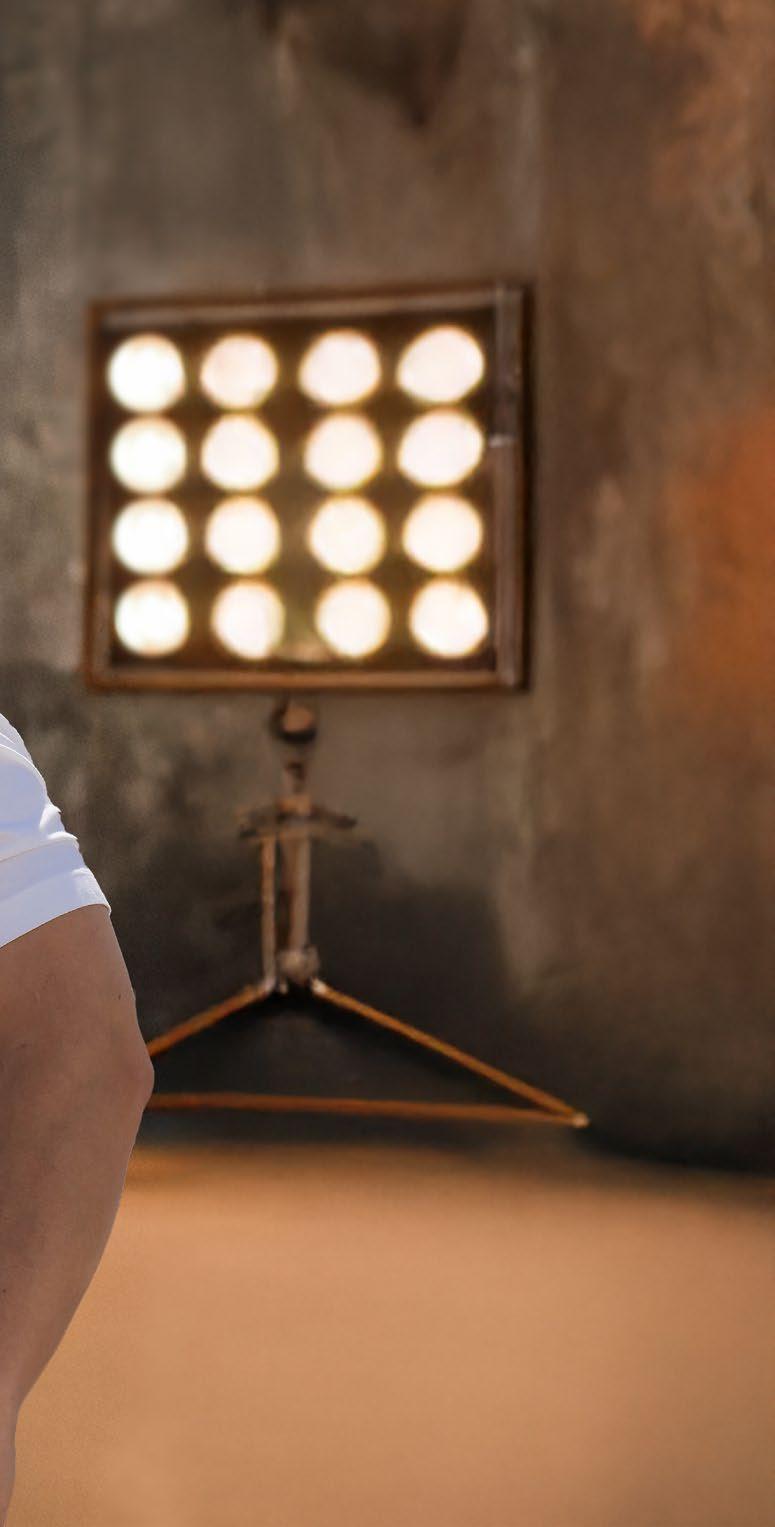

Connections are built on communication. The ALEC model can help.
Ask them how they are and what’s been happening.
Listen and give them your full attention. Turn off the TV and put phones down.
Encourage them to take action to help them feel better. Support them with solutions rather than just telling them what to do.
Check in on them afterwards.
Consultant psychologist Dr Lisa Marsland-Hall agrees it’s vital parents try to do all they can to keep a connection between themselves and their teenagers. As lead of the Building Attachment and Bonds Service (BABS) and a mum of four, she understands the importance of connecting with teens who are striving for independence.
“Relationships are everything! They underpin our whole wellbeing.”
“When a child has a good bond with an adult who loves and cares for them, they know they have a ‘safe base’ to go to when they need support, which helps them make better choices.
“Teenagers can bring parents headache and heartache. They want choice and control over their lives, sometimes ahead of what they're mature enough to handle.”
This is compounded by the constantly updating technology we rely on to stay in touch. Lisa’s advice for parents is to try to keep up so you can stay connected to their world.
“As well as chatting together over family meals, we keep in touch during the day through texts, voice messages and WhatsApp. I joined Instagram so I can follow the kids, share pictures and send each other funny reels. I’m rubbish on the Xbox but I’ll do whatever it takes to stay connected.”
Lisa admits that adolescence can be traumatic for parents, often triggering feelings of loss as children pull away.
“It’s important that we don’t take this rejection personally and keep the bond between us strong. Without it, our children can attach to something or someone else who doesn’t have their best interests at heart. We have to let our teens fly but be there to catch them if they fall.”

For more advice on building healthy relationships with your teenager, visit tender.org.uk
Tilly Lockey (image courtesy of Open Bionics)

Presenter, model, social media influencer and author - there’s no stopping Tilly Lockey. Yet one of her most significant roles is raising awareness of the symptoms and dangers of meningitis, which she contracted as a baby.
Doctors told her parents that their daughter would probably die and to prepare for the worst. After four weeks in hospital, Tilly pulled through
Inflammation of membranes that surround and protect the brain and spinal cord. Some bacteria that cause meningitis can also cause septicaemia or blood poisoning.

Vaccinations to protect against meningitis are free and available through the NHS for:
but the effects of the infection on her body meant she had to have her toes and arms amputated. Fitted with prosthetic arms when she was eight, she was the first person in the world to get wireless bionic hands.
There were no vaccinations available for babies when Tilly was born and she and her mother Sarah both campaign to raise awareness of the disease.
Children through your GP
Children in Year 9 as part of the routine immunisation programme in schools
Adults aged 18 to 25 who have never received a vaccine containing MenC through your GP.
Symptoms of meningitis develop suddenly and can include:
• a high temperature
• being sick
• a headache
• a rash that does not fade when a glass is rolled over it (a rash will not always develop)
• a stiff neck
• a dislike of bright lights
• drowsiness or unresponsiveness
• seizures
• muscle and joint pain (like Hannah, see page 18).
These symptoms can appear in any order. You do not always get all the symptoms. If you have any of these symptoms call NHS 111.

Choosing a bank account or picking accommodation, the to do list before starting college or university is long. Being vaccinated against meningitis could get you the biggest tick.
One in four young people carry the bacteria which causes
meningitis in the back of their throats. This compares to one in ten of the general population.
Mixing with new people, living in close quarters, coughing and kissing means first year students are particularly at risk of contracting the disease. Make sure you are protected.
Get your medical appointments booked and out of the way before you leave for life in a new area.
Check your vaccine records. See your GP to get any boosters or missing ones
Go for a dental check up. The start of term isn't the best time to get a wisdom tooth removed
If you wear contact lenses or glasses, check if you are due an eye test
Talk to your GP or sexual health clinic about condoms and contraception
Register with a local GP or the university medical centre when you arrive
Make sure you have any medication needed for long term conditions. Tell your new flatmates what it’s for and where you keep it.
How can I check if a booster is needed?
• If you’re not sure, check with your GP. You can also access your health records using the NHS App
• Missed a vaccine? It's never too late to catch up and you can’t be over vaccinated. Speak to your GP or school immunisation team about vaccinations.
Read the NHS vaccination tips for parents
More information nhs.uk/nhs-services/ getting-medical-care-as-astudent
Operational manager for School Aged Immunisations Team Nikki (left) with daughter Hannah and granddaughter Aria

Nikki is a nurse working with families to protect children against vaccine preventable diseases. She knows more than most about the devastating risks of meningitis after her daughter Hannah, then aged five, became ill with the infection 20 years ago.
Concerned over worsening wrist pain, Hannah was taken to hospital where a doctor noticed one tiny bruise-like mark on her forehead, a symptom of meningitis. She was given urgent treatment and rushed to intensive care where doctors warned her family she had rapidly become extremely poorly.
Thankfully, after weeks in hospital Hannah recovered but she had to learn to walk again. Even now she still gets aches and pains.
Now a mum herself to nine month old Aria, Hannah, a children’s mental health nurse, was determined to take advantage of all vaccinations available.
“Getting myself and my baby immunised was a priority even before she was born. I can remember how much pain I was in and I was lucky to pull through.”

“I don’t want Aria to ever be as poorly as I was.”
Hannah is aware that people can be concerned about vaccinations for their babies and children, whatever their age.
“I searched to see how other mums prepare for their child’s jabs and came across a lot of online content telling people not to get immunised.
“After what happened to me, I would recommend getting medical advice if you are at all apprehensive. Don’t make what could be a life changing decision because of a post on social media.”

Telehealth nurse advisor Louise Davies is in regular contact with her patients
Our world is more connected than ever. Technological advances mean we can chat with family on the other side of the world as if they lived in the next street.
Now, technology to provide hospital treatment at home is also bringing nurses and patients closer, even when they’re miles away.
Delivering the best care is always at the front of Louise Davies’ mind. As a Telehealth nurse advisor, she is part of the team delivering hospital level care in the comfort of patients’ own homes.
“Frequent clinic appointments to monitor conditions can disrupt people’s lives. With Telehealth, they can choose instead to take a kit home and send us readings of their blood pressure, pulse rate and oxygen levels (sometimes known as stats). We can then easily detect changes and react very quickly to prevent complications.”
“Telehealth gives me the time and opportunity to have regular and meaningful conversations with my patients and really get to know them.”
The technology is also used by patients admitted to hospital with respiratory conditions, as full recovery can often take several weeks.
“Being monitored remotely means people are not stuck in a hospital bed. At home, they are happier, more relaxed and can get better faster. By taking their own readings, patients feel empowered to take control of their own health. They understand the benefits of medication because they can immediately see the effects on their stats.”
Louise has seen another benefit. “The Telehealth system gives me the time and opportunity to have regular and meaningful conversations with my patients. I really get to know them, more than when I have been nursing someone face to face on a ward. As a nurse, I want to support people to be as well as they can possibly be. The information they submit includes a survey, which we use to spark conversations about their overall wellbeing, including their mental health. We can develop real trust between us - it’s what nursing is all about. No matter where we are.”

hen keen golfer Gary Abbott was wracked with chest pains as he stepped off a plane at Manchester Airport, he thought he was having a heart attack. A taxi took him straight to A&E where he was diagnosed with pneumonia and pleurisy. He is also living with diabetes and doctors warned his health would need closely monitoring over several weeks.
In the past, this would have meant an extended hospital stay, but Gary was able to go home the next day because he opted to be monitored using Telehealth technology. He submitted daily readings of his pulse, blood pressure and heart rate to the virtual ward while his wife Linda looked after him. Gary says he was able to rest, relax and recover
because he was surrounded by his family.
“I think relaxing would have been difficult for me on a ward. I knew I’d get well cared for at home and that someone else could benefit from the hospital bed.”
Now Gary is back on the golf course and living life to the full.
A professional chef - and with his diabetes in mind - Linda cooked tasty, nutritious meals to tempt Gary to eat and he was soon well on the way to recovery. “Gary got better quicker because we were at home together. We both felt so reassured by the support he was given.”
When you’re recovering from illness, your body is working hard to repair and rebuild. Choosing foods with the right nutrients is essential for building yourself back up. Linda’s chicken chipotle chilli, which she made for Gary, is full of vegetables and protein but low in salt and fat. The chilli is just as tasty meat free - leave the chicken out and use any vegetables you have. It’s also perfect for batch cooking and freezing, which is great news when you are short on time.


Recipe ingredients to serve 4
• Spoonful of olive oil
• 3 or 4 chicken fillets, cut into chunks
• 1 large onion, chopped
• 4 garlic cloves, chopped or minced
• 1 tablespoon ground cumin
• 1 teaspoon ground cinnamon
• 1 or 2 tablespoons chipotle chilli paste
• 2 x 400g cans tomatoes
• 2 tablespoons tomato puree
• 200g button mushrooms, cut into quarters



• 1 x 410g can green lentils in water (drained)
• 1 x 400g can kidney beans in chilli sauce
• 200g fat free fromage frais
• 3 tablespoons chopped fresh coriander
• A pinch of smoked paprika
• Salt and pepper to season
• 300g basmati or long grain rice
• Lime wedges to serve.

Method
1. Heat the oil in a pan, add the onion and stir fry for 7 to 8 minutes. Stir in the garlic and cook for 1 minute. Add chicken and stir fry for about 5 minutes until cooked through. Add more oil if necessary.
2. Add cumin, cinnamon, chipotle chilli paste, cherry tomatoes and tomato puree. Season to taste, bring to boil and simmer with a lid on for 15 to 20 minutes.
3. Stir in the mushrooms, lentils and kidney beans, then simmer uncovered for 15 minutes.
4. Swirl in the fromage frais and sprinkle with chopped coriander and paprika.
5. Serve with cooked rice and a wedge of lime.


When Sonia Roberts was offered a cup of tea following a consultation, she knew it wasn’t going to be good news.
Her world was turned upside down by breast cancer.
“My first thought was, ‘How are my daughters going to cope?’”
Surgery, chemotherapy and radiotherapy followed. Days were dominated by appointments and pondering the future. Sonia had a loving family, including her daughters, now 26 and 21.
But she was desperate to talk with someone who knew how she truly felt.
A colleague shared a video by Pool of Life, a dedicated team of women who had survived breast cancer and launched a dragon boat team. Sonia saw how much they wanted to win, not just on the water but at life.
“I’d already decided after my surgery that I had a second chance and I should make the most of it, but these women have helped me make it happen.”
“They welcomed me and gave me a place where we can talk openly about cancer but also about all the other things in our lives.”
What Sonia hadn’t bargained for was a newfound passion for dragon boat racing. “I could never have imagined me in a dragon boat but watching them having such fun made me think ‘I want some of this!’”
Sonia jumped in feet first and went from strength to strength. She was recruited to the first national breast cancer survivors’ team and has since made dragon boat history,

representing Great Britain in this year’s World Championships in Germany. This is the first year that breast cancer paddlers (BCP) compete in the championships.
“I needed a distraction. What I got was a lifelong passion and an amazing support network. I’m back in the driving seat, my lymphoedema has almost gone and I have something to aim for.”
She urges people to follow her lead. “I’d say take time for yourself and look at what you can do. It really is possible to take the negative and turn it into something positive.”

Lymphoedema is a long term condition that causes swelling in the body’s tissues, usually in the arms or legs (source: nhs.uk).
Dr Don McKenzie of the University of British Columbia, a global leader in the science of cancer and exercise, discovered that upper body exercises, such as those used in paddling a dragon boat, help reduce the risk of developing lymphoedema following breast cancer surgery.
Dragon boat racing originated in China and each boat traditionally has a dragon’s head and tail. A ceremonial drum and drummer sets the pace and helps paddlers synchronise strokes.
Pool of Life supports people at all stages of breast cancer treatment and beyond. Visit: pooloflife.net
For more information visit merseycare.nhs.uk/ lymphoedema-service lymphoedema

Life in an African embassy seems worlds apart from that of a family carer in Southport. Nurse Sara Yearsley tells MC Magazine how skills from her role in the UK diplomatic service help in her new life as carer for her mum.
Working for the Foreign Office was Sara’s dream. She served as a diplomat in Rwanda as the country dealt with the traumatic legacy of genocide and later worked as a political advisor at the United Nations. But when her stepdad became terminally ill, she decided it was time to return home to help her mum Liz care for him at home in his final months.
Sara retrained as a nurse and 15 years on, she works part time in Sefton Treatment Rooms and is a carer for Liz, who now has mobility and memory problems.
Sara admits that adjusting to life in Rwanda wasn’t easy and she had to find ways to keep up her own morale.
“All your experiences shape you but my time in Rwanda made a huge impact.
“I was working on setting up a new visa service using fingerprint data, so I had to build trust in people who had been through so much.
“It took persistence and an understanding of what people needed from me. Carers do all of this every day.”
Sara admits becoming a carer for the first time can be a daunting proposition.


“It can be scary dealing with things you have never faced before, whether it’s moving to Africa or seeing someone you love in pain.
“When I’m filling in forms or speaking to doctors, I carefully choose information I need to give to get mum what she needs. And if I don’t get the answer I need today, I try again tomorrow.”
Sara describes being able to help her mum as a ‘privilege’ and admits that there are definite positives from her experience as a carer.
“I’ve never regretted my decision to come home for a second. I have quality time with my mum - she was a model in her younger days and I rely on her eye for fashion tips!”
• Know your rights. If you are helping a loved one with their shopping, cleaning, appointments or bills, you are a family carer and support is available for you. Mersey Care’s website has a dedicated section for carers: merseycare.nhs.uk/carers
• Reach out for help. Filling in forms – like blue badge applications or carers’ allowance – can be daunting
• There are no right or wrong decisions – you will know what solution works for you and your family
• Take up the opportunity to talk to other carers. The Carers Trust can signpost you to organisations in your local area.


Reading to children in their early years can help boost speech and language development, attachments and bonding.
By the age of two, most toddlers can say about 50 words clearly. If a child is struggling with their speech, early intervention is vital.
Community groups can be a huge support and health visitors refer children as young as two. Designed by a speech and language therapist, ‘Chattertime’ sessions at the Linaker Family Wellbeing Centre in Sefton revolve around books and the joy of reading.
Mum of two Georgina Whitehead went with her daughter Nola following her two year review. Bringing stories to life using finger puppets, singing and messy play, Nola was captivated and Georgina learned useful tips and techniques.
“Now when I miss out a word, Nola fills it in. I describe everything I’m doing and repeat words – that works especially well at teatime when we’re ‘chop, chop, chopping’ and ‘mash, mash, mashing’! The session built my confidence and I’m using a lot of the same techniques with Nola’s baby sister, Marlowe.”
Helen Pruden, operational manager for Mersey Care’s health visitor team in Sefton said, “Children meet specific milestones at slightly different times.
“We’d urge parents not to panic, but if you have concerns talk to your health visitor.”
Helen says creating a home environment where babies play and interact with books is great but it can start even earlier than that.
“Talking, reading and singing to a baby even before it’s born helps create a strong bond and supports language development.”
Nola and Marlowe love storytime with their mum Georgina
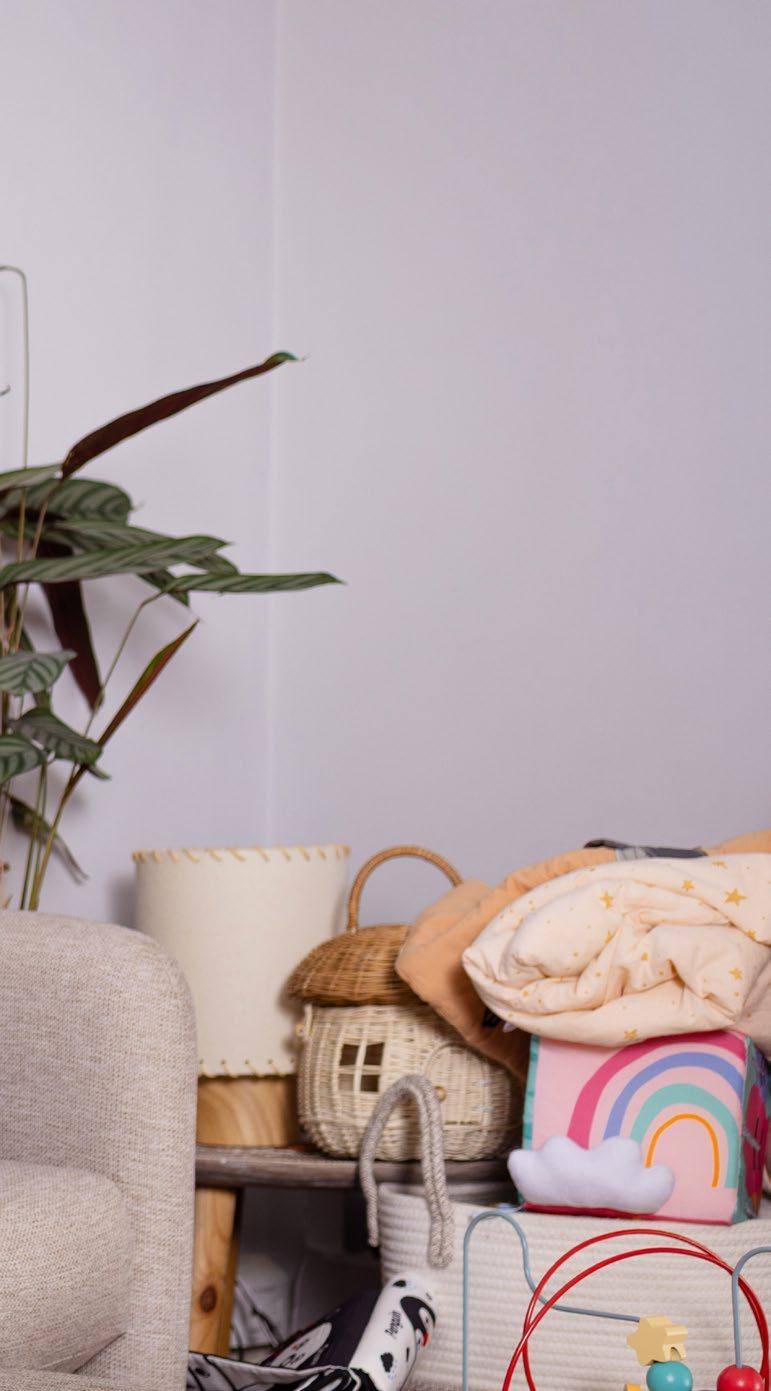
Sign up for a free daily email from the NSPCC giving you tips for ways to support your child
bbc.co.uk/tiny-happy-people
healthforunder5s.co.uk

One of the recommended books used by Chattertime.
Award winning children’s author and screenwriter Frank Cottrell-Boyce describes shared reading as a ‘route to happiness’ for children.
Speaking at the launch of a Book Trust campaign to promote reading, he said, “Those first 1000 days of life, so much happens that sets the course for the rest of your life. If you are read to before you go to school, you not only have a huge educational advantage but also a huge emotional advantage in terms of attachments and bonding.”
Frank grew up in a small flat with his mum, grandmother and brother and remembers fondly regular visits to his local library.
“I don’t think mum was hoping to hothouse us. I think she just wanted to get out and have somewhere nice to sit!
“I’ve just got these unbelievably happy memories... so that’s what makes me passionate about happiness.”
You too can enjoy your local library – they are free to join.
Top Tips Follow the leader
Notice what your child is interested in and talk about these things
Take a choice
Ask questions that can’t just be answered by ‘yes’ or ‘no’. For example “Would you like a yoghurt or a banana?”
Time to think
Give them time to get words out
Not just books
Read anything with children – recipes, birthday cards, shopping lists will all build fluency and confidence

Paula will graduate as a registered nurse later this year


Three years ago Paula was working in a school - this November she will graduate as a registered mental health nurse with a guaranteed job and no student debt.
Working as a teaching assistant in a special needs school sparked Paula’s passion for mental health care. “As much as I loved working in a classroom, I was trying to support children who’d had very difficult experiences but felt I didn’t have the skills. I really wanted to be able to do more for them.”
Have you dreamed of becoming a nurse but been held back for whatever reason? The Nursing Associate apprenticeship could be the stepping stone to a new career. With no course fees, you earn while you study for a foundation degree and have a guaranteed job at Mersey Care.
Paula started a nursing degree 16 years ago but dropped out of university in her first year. With a mortgage and plans to start a family, giving up her wage to be a student again was not an option.
“When I saw the opportunity to train as a nursing associate advertised, I grabbed it with both hands! You earn while you learn and at Mersey Care there’s a guaranteed job at the end. It was the security I needed to be able to make the leap into a whole new career.
“I’ll be the first one with a degree in my family. I feel like a great role model for my little girl and my parents are going to be so proud.”
“At first I was full of self doubt - I hadn’t written an essay in a very long time! How was I going to cope going to uni and with a baby? But I knew this time I had the drive and determination. I was more mature and in a whole different headspace.”
After completing her two year Nursing Associate foundation degree last March, Paula successfully applied to ‘top up’ her qualification and become a fully registered nurse with additional funding and support available from the Trust. With no student debt and a guaranteed job, she is due to graduate with a BSc degree in mental health nursing in November.
Phil knew he had a lot to offer

Serving his local community was always one of Phil’s priorities and after working with children in a special needs school, he realised health care was his real passion. But it was during the COVID pandemic that he realised how much he had to offer.
“Working as a health care assistant during COVID made me realise what I was capable of. Even though I was community based, my clinical skills were needed on the wards. I’ve got a young family so I needed to earn a wage but I knew I could be doing so much more.”
Looking for a chance to progress his career, he successfully applied for a student nursing associate position with Mersey Care. After working in the team four days a week with one day at university, he now has a foundation degree and is loving his job as a nursing associate in the School Health Team.
“I realised I was capable of achieving so much more.”
The qualification includes learning about all four fields of nursing (adult, children’s, mental health, and learning disability) but student nursing
associates in this Trust are based in the team which will employ them when they are qualified. Phil thinks there are huge advantages to this. “You want to hit the ground running on your very first day, so everyone you work with really invests in your development. My manager and our educational lead were always on the look out for the latest training and extra learning opportunites to bring out the very best in me.”
Phil says the support he’s received has helped him make a real difference from day one to the families who need his support. Now he’s looking to the future. “It was a lot to juggle at the time but I’ve had a fantastic opportunity to develop my career. My ambition is to specialise in children’s nursing. The foundation was a great start to build on and achieve my full potential.”
Angela Charles is Mersey Care’s Practice Education Facilitator supporting student nursing associates at Liverpool John Moores and Edge Hill universities. She says, “So many of our students are people who never saw themselves going to university but often have years of experience and knowledge to draw on. This qualification is an incredible opportunity for them and the Trust - investing in their future together.”
Opportunities will be advertised on Mersey Care’s job vacancy page.
You will need to:
be at least 18 years old
have at least two GCSEs at grades 9 to 4 (A* to C) including English and maths, or Functional Skills Level 2 in English and maths have 12 months' experience in a care setting
be capable of studying at Level 5 and commit to completing the foundation degree programme.
Visit merseycare.nhs.uk/ student-nursing-associates for more information and to register your interest.
Bob, 68, cycles more than 100 miles a week

Later life was traditionally a time to slow down –but lifestyles are changing.
People are becoming grandparents or retiring later and – according to the Office of National Statistics – living longer, healthier lives. Taking up a new hobby is a great way to keep us healthy as we age, especially if it helps us include exercise into our daily routine.
Fifteen years ago, Bob Taylor, 68, from Earlestown hardly used his bike - now he cycles up to 100 miles a week. In 2009 he was diagnosed with an irregular heartbeat, which had left him feeling dizzy and short of breath. “I was only 53, I wasn’t going to let this health issue make me feel old and ‘past it’.” His brother, a keen cyclist, suggested he give it a go and he’s never
Start with five to ten minutes a day and your fitness will improve.
• Park further away from the shops or work or get off the bus a stop early
• Walk around on the phone instead of sitting
looked back. “It’s low impact so it doesn’t put pressure on your joints and it’s a fantastic cardio exercise if you can include a few uphill climbs on your route. I’m nearly 70 but I don’t think I’ve ever been fitter – even after my heart trouble.”
Daniel Melling, Health and Wellbeing Coordinator for Mersey Care, says, “Being active every day helps us stay healthy into old age. Activities like brisk walking, cycling, swimming and dancing will help keep your heart and lungs fit. Build up to two and a half hours per week. Lifting weights, carrying heavy shopping bags or even digging in the garden strengthens your muscles and bones. Do these twice per week to stay strong.”
Thomas Yates is a professor in physical activity, sedentary behaviour and health at the University of Leicester who studies the impact of lifestyle
• Get up every 30 minutes when watching television.
Scan the QR code for more information:
on ageing.
He told The Guardian, “It’s never too late to start cycling or any form of exercise. People who become more active in midlife or older age get tremendous benefits when it comes to longevity and preventing ill effects of ageing.” His study also discovered that even introducing a brisk daily walk can reduce your biological age by up to 15 years. “Changing a 14 minute daily stroll into a seven minute brisk walk can reduce your risk of cardiovascular disease, so we should all pick up the pace a bit.”
Speak to a GP first if you have not exercised for some time, or if you have medical conditions or concerns.

Chief Executive Officer for Sefton Carers Centre, Vicky Keeley joined Mersey Care’s Council of Governors eight years ago. As well as her professional roles, Vicky is a family carer and looks after two rescue horses and a rescue dog.
“I have worked in voluntary organisations for more than 20 years to support local communities around health and social care issues. Making sure carers’ voices are heard at a strategic level is my biggest achievement as a governor.
The public and voluntary sectors need to work closely together.
One of Mersey Care’s most significant successes is the strategy and support for carers that they’ve put in place. The Trust has come a long way in recognising the needs of carers and the huge importance of their role - I am a carer myself and I know a ‘whole family’ approach is essential. Unless you support both patient and the carer, things can fall apart.
As a CEO, I am held to account by my own board of trustees. My experience on both sides of the table makes it clear to me how important it is to have a supportive board with people that are open and feel able to challenge.
When you’re focused on getting a job done, you can become blinkered. If someone who is invested, but is not as closely involved, examines your work and raises questions, it opens your eyes wider. I think Mersey Care’s board is robust and open to that challenge. When you get answers, then you get change.”
The Annual General Meeting is a great opportunity for you to find out more about our Trust, including our achievements and challenges, as well as our Annual Report and Accounts from last year. If you would like to join us, please register your attendance by emailing AGM2025@merseycare.nhs.uk and the MS Teams link will be circulated ahead of the meeting. Visit merseycare.nhs.uk/mcft-agm to check times.
Find out more about our membership and governors at: merseycare.nhs.uk/aboutus/council-governors Phone: 0151 471 2303 Email: ft.membership@merseycare. nhs.uk Write to: Corporate Affairs, Mersey Care Trust Offices, V7 Building, Kings Business Park, Prescot, L34 1PJ
Thursday, 18 September 2025
Virtually, via MS Teams
